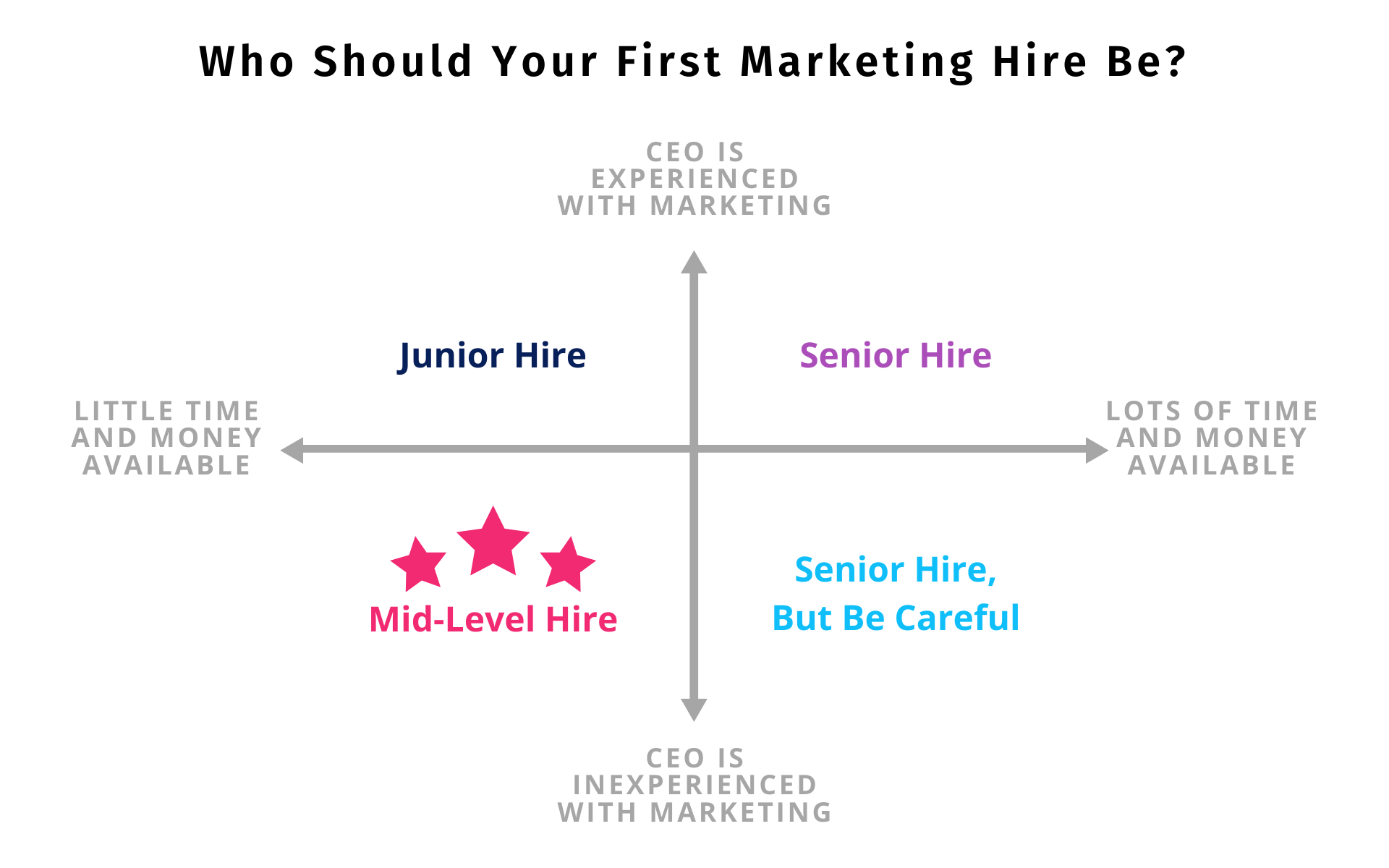This post is part of our Hiring series. Check out our previous posts here:
- Should I hire an in-house marketing employee, or work with a marketing agency?
- Should my first business hire be marketing or sales?
- The complete guide to building your first enterprise B2B marketing team
I was recently interviewed by Liat Lazar, who runs the best HR podcast in Israel, HR2GO. The topic was “How should early-stage startups build a marketing function?” We talked about when to make your first marketing hire, whether to hire an employee or go with an agency, where should this person be based, and more.
You can listen to the full interview (in Hebrew) here. In this post, we summarize the interview and answer additional common questions about this important and challenging process.
When should you start? When is the right time to make your first marketing hire?
It’s never too early. A good marketing lead will help you get to know your audience and improve your product, things that should start on day one. In reality, because of budget and time constraints, startups usually start thinking about marketing after a funding round, usually Seed or Series A. At this point, they’re able to have a marketing budget (even a small one), and set sales goals that go beyond the first few customers they acquired thanks to the CEO or investor network. This is the moment when they want to add fuel to your marketing and sales fire by:
- Understanding their positioning and value proposition: sharpening their messaging, marketing language, and brand
- Building their marketing infrastructure with a website, sales collateral, and basic marketing tools (CRM, email marketing platform like Mailchimp)
- Planning and executing demand generation campaigns — content, email, conferences, PR, webinars, etc.
Usually, the startup’s initial team doesn’t have the necessary skills for these activities, hence the need to start bringing in marketing expertise.
How do you build the initial marketing function? What’s the first position to hire?
This is really the $1M question. We developed a 2×2 matrix to help us think through it. One axis is whether the CEO is experienced and knows marketing (had worked in marketing in the past or is an experienced founder who had worked with marketing leaders). The second axis is whether the company has some runway of time and money (which are really the same).

- Top right quadrant / Senior hire: an experienced CEO who knows marketing, and a startup that has time and money to invest in building things right. In this scenario, look for a senior marketing leader, say a VP, and let her build her team top-down. The CEO knows how to find and work with such a person, and the company has the time and budget to search for her, pay her, give her the right marketing budget, and the time she needs to build her team. This is a relatively easy (and uncommon) scenario.
- Bottom right / Senior hire, but be careful: the startup has time and money, but the CEO is inexperienced with marketing. In this case, you should still look for a senior marketing hire, but acknowledge it will be hard for the CEO to find the right person. We’ve heard many stories about Israeli CEOs who were bedazzled by American candidates who had polished resumes with impressive names, and flawless English – candidates who were great at selling themselves, but weren’t the right fit. Hiring such a candidate results in a bad experience for both parties, and a waste of time and money. To prevent this, work with people who have experience identifying good marketing leaders – like your investors, and mentors – and conduct interviews and reference checks with them.
- Top left quadrant / Junior hire: An experienced CEO, but a startup with no time or money to spare. Must show results ASAP, with limited budget. In this scenario, go for a junior marketing hire — a college or university grad with a few years of work experience (not even necessarily in marketing), hungry, curious, fast learner. The CEO will own the strategy, and teach and guide the marketing hire, who will execute the tactics.
- Bottom left quadrant / Mid-level hire: an inexperienced CEO and a startup with limited time and budget. This is a common scenario and here you should go for a mid-level marketer. Someone who has managed marketing in other startups, was successful, knows what to do and how to manage – at least herself – but not so senior that she doesn’t want to get her hands dirty.
This is an amazing profile, but very hard to get. Usually good people who reach this stage in their careers want to do something else, like be a VP or CMO, work for bigger companies, make more money, manage a team. Competition over these marketing unicorns is fierce.
Should I hire an in-house marketing employee, or work with a marketing freelancer / consultant / agency?
Graduating from working with an agency and going in-house is an exciting milestone.
This is an excellent question, and all the startups we talk to obviously debate this.
As a marketer, I strongly believe marketing should be a core competency of every startup, and something that you should do in-house. But unfortunately, there are trade-offs. Finding the right marketing lead can take a long time, especially if you are in the bottom left quadrant. Finding the perfect mid-level candidate, who’s hands-on and also strategic, can easily take a year, and cost a lot of money. Even when you find this person, it takes time for her to ramp up, find suppliers, and hire additional team members. The upshot? Oftentimes startups we talk to realize it’s been a year without any significant progress in marketing (and sales).
The alternative is working with a freelancer, a consultant, or a marketing agency. They can start adding value within days or weeks. They have their trusted vendors, and they’re experienced in quickly learning a new company and industry.
They can help startups recruit an in-house person who’ll eventually replace them. I have worked with clients on recruiting junior and senior marketing employees to replace us – I call it “graduating” from working with an agency, and it’s an exciting milestone.
In addition, startups often set to hire a marketing person, and in parallel hire a salesperson. This makes a lot of sense, as sales needs marketing support. In this case, we definitely recommend accelerating the process so you don’t leave your sales team fending for themselves.
In short, there are always tradeoffs. If you want to move fast, consider bringing in external reinforcement.
Is it more expensive to work with a marketing agency compared to hiring an in-house marketer?
You can wait six months for the perfect marketing hire, and in the meantime make zero progress with marketing. Or you can start working with an agency and close two incremental deals.
There are two ways to think about cost when considering an agency vs. an in-house marketer:
- Substitutes: If you compare the cost of a marketing agency or a consultant to the cost of a marketing employee, or a marketing team, often the agency’s cost is lower. When calculating the cost of an employee, you should factor in salaries, benefits, time off, office/food costs, and the cost of recruiters or headhunters.
- Value: Startups’ most valuable resource is time, not money. You can wait six months for the perfect marketing hire, and in the meantime make zero progress with marketing. Or you can start working with an agency and close two incremental deals. In this case, the agency clearly more than paid for itself. This is particularly true for B2B startups that sell to enterprises, where deals take many months, and the ACV (Annual Contract Value) is high (tens or hundreds of thousands of dollars). More here: At About $2m in ARR, Every Great Hire Will Be Accretive.
Where should the first marketing hire be located? In Israel? In the US?
The more early stage a startup is, the closer marketing needs to be to the CEO. So the question really is: where should the CEO be?
Make no mistake: There are great B2B and B2C marketing people in Israel. And there are startups that have kept the majority of their operation, including the CEO, in Israel, and have built amazing companies: Monday and Wix are two examples. Corona-time has enabled remote like never before. Intel acquired Movit for $900 million over Zoom, and startups are raising funding over Zoom, etc.
So you don’t have to be in the US. Things can happen from Israel, as well. But I still believe that if you’re a B2B startup targeting Enterprise, Fortune 500, US-based companies, you should be close to your target market. It’s not a must, but it’s a huge advantage, and as a startup, you want every possible advantage. Getting on the subway or taking a short flight, going to a restaurant with a prospect, looking in their eyes over steak (or salad) and closing a million-dollar deal… much more effective than using Zoom.
In short, R&D can be in Israel, but customer-facing functions (CEO, marketing, sales, customer success) will benefit from being close to the market. If you’re targeting the US, the typical locations are New York City or San Francisco / the Bay Area. I’m not objective, but my strong recommendation is New York City. Read why here.
I’m a technical founder and CEO. How should I evaluate marketing candidates?
The key is to simulate actual work as much as possible. Don’t be afraid of using exercises, even with senior candidates.
A good exercise for senior candidates is crafting a plan for her first quarter on the job. Keep the question open, answer any questions she may have, and supply background information when asked.
This is a revealing exercise. Does the candidate produce a presentation full of buzzwords and high-level strategy, or does she dive into the details, research competitors, and build a budget spreadsheet?
For a junior candidate, one of our favorite exercises is writing a post for our blog.
Here’s a post that details our exercises.
What skills and experience should I look for in a candidate? Should I look for someone with experience in specific marketing channels, like conferences or content? Should I expect this person to be familiar with all marketing channels?
One of the common mistakes CEOs make is to expect their first marketing hire to be an all-knowing marketing unicorn. Marketing is a huge discipline of very different domains. I’ve yet to meet the marketing leader who’s equally knowledgeable about branding, analytics, content, and online advertising. A good marketing leader is aware of their strengths and weaknesses, and knows how to hire employees or partner with vendors to fill in the gaps. You should support her by allocating time and budget for her to do so.
Here are the things you should be looking for in your first marketing hire, by decreasing order of importance:
- Experience with similar size ACV. More on that here
- Experience leading startups to success (as a marketing leader)
- Experience leading marketing in similar stage startups, and the next stage (e.g. Seed and A)
- Experience in marketing management (building a marketing budget, plan, and calendar, and managing a team)
- Experience in your industry (e.g. finance, cyber, e-commerce.)
- Experience with specific tools, channels, and marketing technologies.
What mistakes have you seen CEOs or companies make when hiring their first marketing person?
Thinking that marketing is “blue pens,” and failing to understand that good marketing can propel you to the next level of growth.
- Thinking it’s “set & forget.” That once you checked the box of hiring your first marketing lead, she’ll just run with it. Well, quite the opposite. Hiring this person is only the beginning, and to make her successful you need to invest. Invest time in teaching her about the product, customers, competitors – and not just as part of her onboarding. Invest time in participating in marketing campaigns — speak on webinars, help with content creation, go to conferences, enlist clients for testimonials.
- Not defining clear KPIs, and then complaining that marketing is not working. More here: our favorite marketing KPI isn’t leads.
- Expecting marketing will create product/market fit. This is a common and grave mistake. You can’t outsource your product strategy, and you can’t expect your marketing person to wave their magic wand and make the market love your product — the product with the brilliant technology that unfortunately doesn’t have any real-life use cases yet. A marketer can help you experiment with different personas, run campaigns targeting different markets (banking or e-commerce? US or UK?), but she’s not going to find the problem that your product solves.
- Disrespect. Thinking that marketing is “blue pens,” and failing to understand that good marketing can propel you to the next level of growth. Thankfully, I’m seeing this less and less of this with Israeli startups.
The bottom line
It’s never too early for a startup to start thinking about their marketing team. Making your first marketing hire is not a one-size-fits-all process, and your hiring strategy will depend on your CEO’s experience with marketing and how much time/money you have on hand. Taking time to reflect on what type of marketer your startup needs, and then investing in that person’s growth, will pay off in both the short- and long-term.
Related reads (or listens)
- [Hebrew] Netta on HR2GO, Liat Lazar’s HR podcast
- [Hebrew] Interview with Shlomi Ben Haim, Founder and CEO of JFrog on the Globes Roadshow podcast. Among other things, a good discussion on why having presence in the US is crucial.
- Our favorite exercises for evaluating marketing candidates








